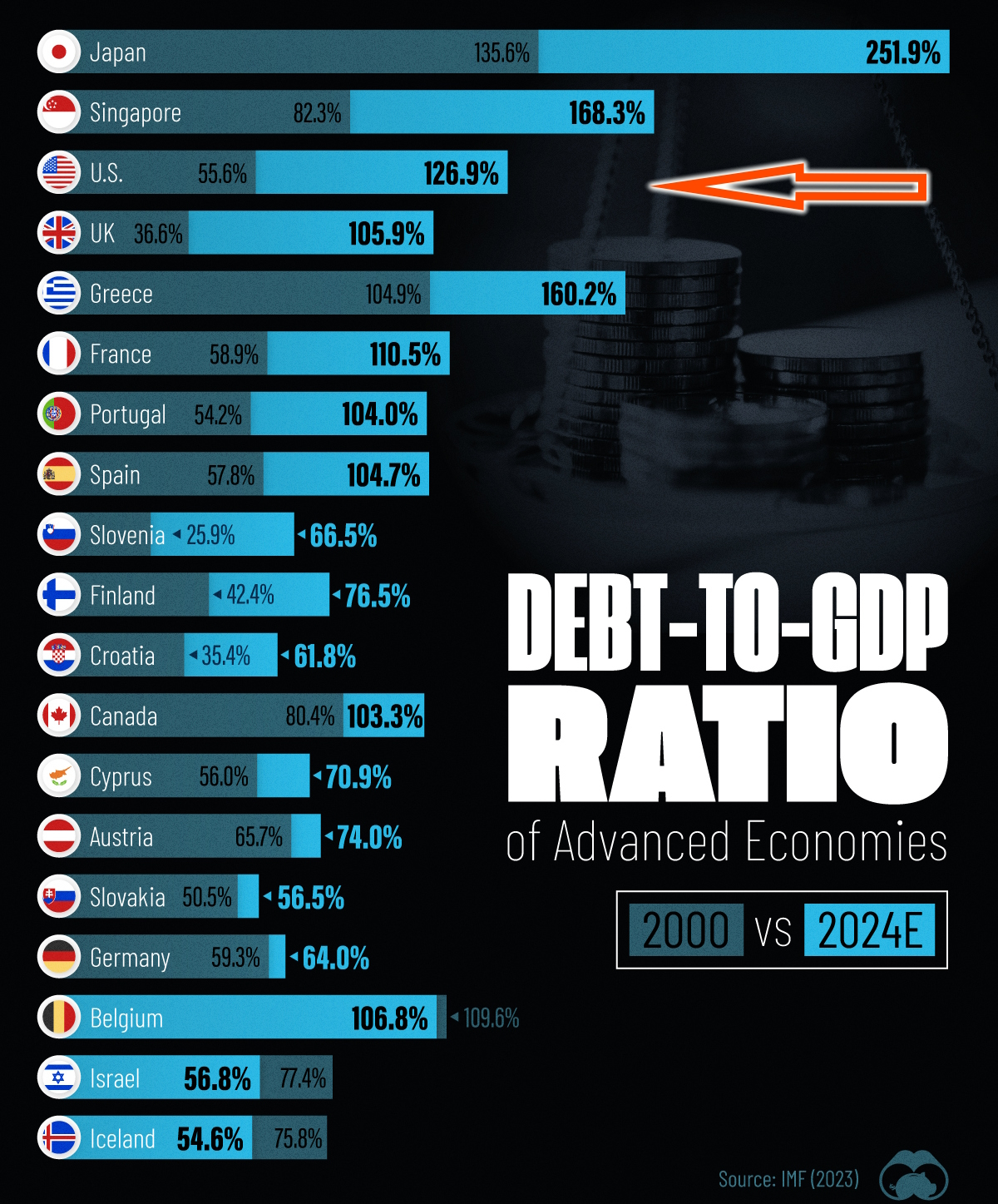

These ADHD memes hitting a little too hard
I’m mostly half-serious.


These ADHD memes hitting a little too hard
What’s really crazy is when you spend a ton of time editing an image because you think the idea is funny and the post goes nowhere. Then you repost some bullshit and it makes front page.

I never said we should have zero debt, that’s a strawman. Most economist recommend a moderate amount of debt due to various positive effects (some of which you mention). So the real disagreement comes here:
It’s all connected and that’s why running a deficit, a (relatively) small one, is a good thing.
The implication being that you think the U.S. has a (relatively) small amount of debt. Now, I am willing to be convinced otherwise, but I do not think that the U.S. currently has a small amount of debt. Our debt to GDP ratio is higher than other developed nations, which is concerning.

I do concede that we aren’t in danger of a debt crisis on the scale of Greece or Sri Lanka. But ~$34 Trillion in debt needs to be part of the discussion when we keep praising the economy.
My experience has been the opposite. Lemmings take everything too seriously.
Lotta BIG QWERTY’s on Lemmy
edit: I thought you were using ‘QWERTY’ as a pejorative term for ‘know-it-all’. Turns out you actually mean the keyboard.


Bookpilled. If you’re into science fiction books, he’s a great YouTuber to check out.
edit: Also, he does extra videos on his Patreon. But if you don’t like him try Outlaw Bookseller and Media Death Cult.
Well I suppose it depends on your views of consciousness. Some would argue that our consciousness is nothing more than an emergent phenomenon grounded on the electrical impulses of our neurons. Personally, I’m convinced that the phenomenon need not be physical. It should be possible, with enough computing power, to model the same interactions. But I admit that if you reject this possibility, then the simulation hypothesis loses credence.
Yes, this is the idea. Although, as another noted, you can argue back and forth on whether Bostrom’s argument holds.
The argument makes less sense outside of it’s context. Moore was responding to the skeptical position that we’re all in a simulation. Moore argues that this skeptical argument undermines itself: all of the language, terms and concepts which form the simulation argument are based on the sensory experience that the argument would effectively dismiss. Furthermore, any argument that we’re in a simulation is epistemologically on a par with the argument that we’re not. Therefore we should have less confidence in the skeptical argument than the common sense conclusion that we have hands.
Sorry, I suppose people haven’t heard of the “Simulation hypothesis” in philosophy.
Nick Bostrom argued that, statistically, it is more likely that we live in a simulation than not. Assume that an advanced civilization could build a machine with enormous computing power, sufficient to simulate a human mind and a universe “around” it. It follows that the number of such simulated minds/universes could be near infinite. So the probability of our actually being in a simulated universe dwarfs the probability that our reality is not a simulation.
I’m agnostic. If you find the statistical probability argument for the existence of aliens salient, then by the same token you should believe that our reality is a simulation. In which case, the existence of aliens once again becomes questionable; the statistical probabilities of an infinite simulated universe are outside the realm of our current knowledge.
edit: See comment below on Nick Bostrom’s Simulation Hypothesis.
Reminds me of the G.E. Moore epistemological argument against universal skepticism:
Philosophy sometimes goes so far that an appeal to common sense is a breath of fresh air.
Yeah, I decided to take it in a different direction. Europeans have probably had enough lol
If we can pick math, then I choose logic.


I’m going to say no. Most of human history is nasty, brutish, and short.


I think they’re saying two things. 1) You have to live for a few million years in the past in order to get a billion dollars when you reach the present age. 2) You can’t just go to sleep for a long time to get out of the scenario.


Can God kill Himself.?" This presumes God is a physical and material being.
I’m afraid I don’t see why being non-physical entails being eternal. For example, couldn’t God create an angel and then destroy it later? If angels are non-physical beings that can be created and destroyed, then immateriality doesn’t entail eternality. Moreover, you’re right that God cannot die, but it doesn’t follow that the answer to question #1 is “no”. If there was something that God couldn’t do, then God wouldn’t be omnipotent. So the question asks can God commit a logically contradictory action.
God would then be both a non material being, and a material being in which he animates, that has the potential to lift the stone. Now if you belive that every material object has consciousness…
I think our starting assumptions are somewhat far apart.
Well I guess that explains it lol